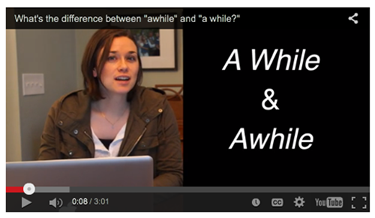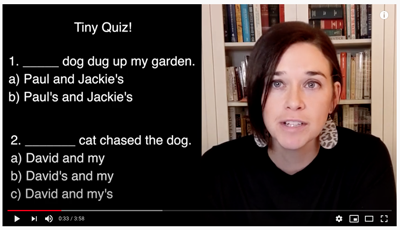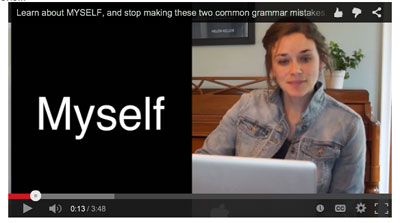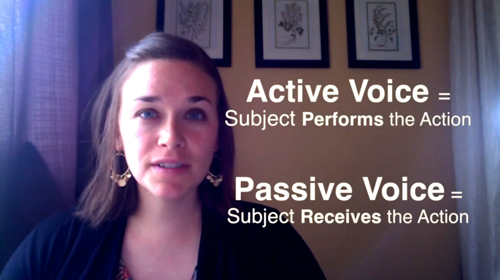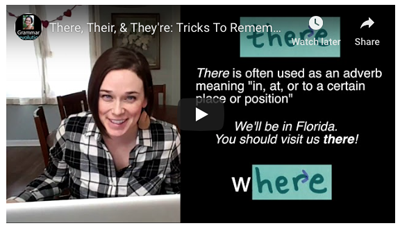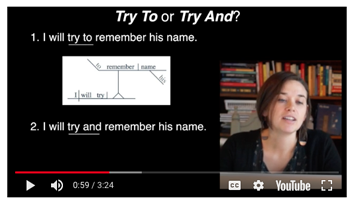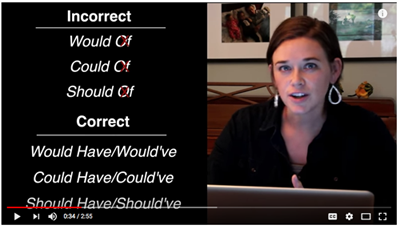Download your free grammar guide here.
Download your free grammar guide here.
Grammar Rules, Standard English, & Proper Grammar Usage
Grammar Rules, Standard English, &
Proper Grammar Usage
- Home
- Usage & Rules
Why should you learn proper grammar?
People judge you based on how you write and speak. Taking the time to follow the rules of Standard English in your formal writing and speech allows you to present yourself in the best possible light.
You can learn more about what Standard English is and how it impacts our lives by watching our documentary on grammar and grammar education. (It's free!)
On this page, you'll find lessons and tips that will help you use proper grammar. This means that we're dealing with issues of what is called grammar usage. It's kind of a grab bag of topics (whereas learning about grammar is a more structured process), but I think you'll find these lessons helpful!
Proper Grammar Usage Topics
Psst! I would strongly suggest that you look into getting a usage guide if you don't have one yet. Seriously. Usage guides give you guidance for using problematic words and expressions.
Awhile vs. A While
What's the difference between awhile and a while? I'll teach you!
Capitalization Rules
Learn just the nitty-gritty when it comes to capitalization rules. Here, you'll find six main rules and a few sub-rules.
Compound Possessives
Where does the apostrophe go when you're forming compound possessives? Which are correct?
- Jim and my cat is cute.
- Jim and my's cat is cute.
- Jim's and my cat is cute.
- David and Elizabeth's car is blue.
- David's and Elizabeth's car is blue.
Learn more about forming compound possessives here!
Everyday or Every Day?
People often mistake the word everyday for the phrase every day. Have you ever made this grammar mistake? The rule is fairly easy to grasp. Read the lesson and take the quiz!
Learn more about this common grammar mistake.
Idiomatic Expressions
These things drive me up the wall. I'm just kidding. Actually, I really enjoy learning about idioms. Idioms are groups of words which have meanings that are not literal.
Drives me up the wall = Makes me crazy
While they are fun to learn about, they can be difficult to grasp, particularly for people learning English as a second language. Learn more about idiomatic expressions here.
7 Common Pet Peeves
Here are seven of the most common grammar pet peeves. Are any of these on your list? Find out these seven grammar pet peeves here.
Misplaced Modifiers
Do you know what a misplaced modifier is? Today is your day to learn about these guys! Learn more about misplaced modifiers here.
Misusing the Word Myself
Many people misuse the word myself. Here are two examples.
Carl and myself ate lunch. --> Incorrect
Mike cooked lunch for Carl and myself. --> Incorrect
Passive Voice or Active Voice?
What the heck does this mean? How can sentences have voices?
Voice refers to whether the subject is performing the action or receiving the action of a verb.
How do you write these and which should you use? I'll teach you!
Sentence Ambiguity
Sometimes, sentences that we write can be interpreted in multiple ways. When this happens, we can call the sentence ambiguous (open to more than one interpretation). If your intention is to write an ambiguous sentence, then there's no problem! However, if you'd like your sentence to be clear, you'll need to rewrite it. Here's an example of an ambiguous sentence I found on a chocolate bar wrapper.
Subject Verb Agreement
What does it mean for a subject and a verb to agree? It refers to the number of the subject and the verb. Learn more about subject verb agreement here.
There, Their, & They're
Learn a few tricks that will help you remember these commonly confused words! Read more and see the video here.
To me or To I?
Should you say, "Send the file to Keith and me" or "Send the file to Keith and I"? Learn about this mistake and subject and object pronouns.
Try to vs. Try and
Do you usually use try to or try and? Did you know that this can be a controversial grammar topic?
We or Us?
We sometimes use the pronouns we and us after nouns. How do you know when to use the pronoun we and when to use the pronoun us? Which one is correct?
We sisters met for lunch.
Us sisters met for lunch.
Would of, Could of, Should of?
Who vs. Whom
Many people have a hard time knowing when to use which word. I'll teach you how you can figure it out, and I'll also teach you a little trick that will make it easy. Read more about who vs whom here.
If you'd like to teach or learn grammar the easy way—with sentence diagrams—check out our Get Smart Grammar Program.
It starts from the very beginning and teaches you grammar and sentence diagramming in easy, bite-size lessons.

Hello! I'm Elizabeth O'Brien, and my goal is to get you jazzed about grammar.
Yesterday, my son said, "Verbs are my favorite parts of speech." I think it's an indication of a successful grammar program when a child can pick his favorite part of speech. Yeah!
- Mary, Homeschooler
I hope you enjoyed these lessons on proper grammar usage. :)
Our Free Guide Gives You A Fun Way
To Teach And Learn The Basics v

Elizabeth O'Brien is the creator of Grammar Revolution.
Her lessons are guaranteed to give you more confidence in your communication skills and make you smile. :)
